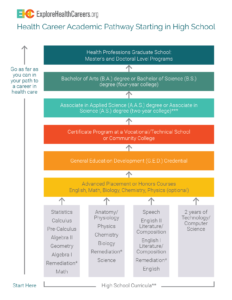
We sat down with Marcia Boynton, Director of the Institute for Health Studies and Health Professions Advisor at Adrian College in Michigan, to answer some frequently asked questions about preparing for a health care career.
What education is needed to pursue a health career?
The answer to this question varies, but this health care pathway provides some context on where each step fits in the overall plan. Once you narrow down the field that you’d like to enter and the position that you’d like to work towards, you’ll be able to determine the specifics of what courses you need to take and which credentials you’ll need to earn.
When should I choose a major?
Choosing a major in your sophomore year gives you time to lay out a plan to complete all required courses, which may not be offered every semester. If you are committed to going straight to health professions school after four years of college, Boynton advises you to commit to a conventional science or health professions major. For many health professions programs, that will mean biology. Discuss the health profession you plan to pursue with your advisor for help figuring out which major will best prepare you for graduate school.
What can I do to prepare if I’m still in high school?

Accumulate credit before you get to college. Can you take dual enrollment courses at your local college while you are in high school? If so, you may be able to accelerate your progress. “If you can take college biology, for example, while you are in high school, you may be able to skip it when you get to college and opt for more advanced courses like genetics or microbiology,” says Boynton. A student she advised took 10 dual enrollment courses at her local community college while she was in high school, which provided her with enough credits to enter college as a second-semester sophomore.
If dual enrollment isn’t a possibility, consider AP courses as a way to test out of as many introductory courses as possible. Check with the colleges you are considering before you take those courses. Not all colleges accept AP examination scores for course credit, and some may not even use them to let students test out of introductory courses.
I’m a college freshman and declaring my major next year. How do I stay on the right track?
Once you are in college, take science and math courses that will challenge you during your freshman year. “In my view, this gives students an early answer to the question of their sustained interest and likely performance in ever more difficult coursework at the junior and senior levels and in professional school,” says Boynton. “I remind students—if you don’t like the study of science now, you are unlikely to enjoy it year after year over the next four to six years.”
What if I find out I don’t like the field I chose?
Have a plan B. And maybe a plan C. Boynton believes that many students may not understand the dedication and focus needed to complete requirements for entry into many health professions schools, including medical, dental and pharmacy schools. “A student can change majors or make a high-level commitment to other activities like sports, but should do so understanding this choice may delay his or her personal application schedule.”
Once you get to college and start taking the classes you need, you may realize you don’t like them. Or you may realize you don’t have the drive and commitment it will take to successfully complete the required undergraduate courses, let alone the graduate courses. Recognizing those things about yourself is not failure, and it doesn’t mean you can’t pursue a health care career. It does mean you may need to find another route to your goal or find a career that is more in tune with your personality, experience and aptitude.
Your plan B may be to prepare for another career. It’s usually fairly easy to change your major in your freshman or sophomore year and still graduate on time. Or you may take another route to your chosen career by taking an extra year in college to prepare, taking a gap year to do some extra studying for entrance examinations or taking some time off to work. All of these are perfectly good choices to make.
Another scenario to consider—one that happens to thousands of students each year—is that you may not get accepted to any of the health professions schools you apply to the first time. Your plan B may be graduating and getting a job that will build your related experience. Or you may decide to enroll in a post-baccalaureate program to improve your academics or enhance your study skills.
